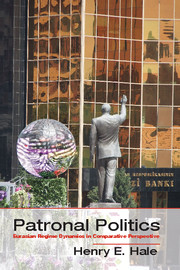Book contents
- Frontmatter
- Contents
- List of Figures
- List of Tables
- Acknowledgments
- Note on Transliteration
- 1 Introduction
- 2 Patronal Politics and the Great Power of Expectations
- 3 Eurasian History as Patronal Politics
- 4 Constitutions, Elections, and Regime Dynamics
- 5 The Emergence of Networks and Constitutions
- 6 The Building of Eurasia’s Great Power Pyramids
- 7 Revolutions and Other Presidential Ousters
- 8 Nonrevolution in Post-Soviet Presidential Systems
- 9 After Revolution
- 10 Patronal Parliamentarism
- 11 Explaining Post-Soviet Regime Dynamics
- 12 Patronal Politics in Global Comparative Perspective
- References
- Index
- References
4 - Constitutions, Elections, and Regime Dynamics
Published online by Cambridge University Press: 05 November 2014
- Frontmatter
- Contents
- List of Figures
- List of Tables
- Acknowledgments
- Note on Transliteration
- 1 Introduction
- 2 Patronal Politics and the Great Power of Expectations
- 3 Eurasian History as Patronal Politics
- 4 Constitutions, Elections, and Regime Dynamics
- 5 The Emergence of Networks and Constitutions
- 6 The Building of Eurasia’s Great Power Pyramids
- 7 Revolutions and Other Presidential Ousters
- 8 Nonrevolution in Post-Soviet Presidential Systems
- 9 After Revolution
- 10 Patronal Parliamentarism
- 11 Explaining Post-Soviet Regime Dynamics
- 12 Patronal Politics in Global Comparative Perspective
- References
- Index
- References
Summary
As Chapter 2 argued and Chapter 3 illustrated, patronalism is a social equilibrium whereby individuals organize their political and economic pursuits more around the personalized exchange of concrete rewards and punishments than around abstract, impersonal principles such as ideological belief or categorizations that include many people one has not actually met in person. It can be conceived of as a kind of collective action problem, a vicious cycle whereby individuals understand politics as an arena of personal wealth redistribution and targeted coercion and therefore reproduce these very practices themselves for fear of being the “sucker,”the feckless soul who acts on principle but only succeeds in impoverishing one’s family, marginalizing oneself, and accomplishing nothing. For individuals in highly patronalistic societies, what matters most for one’s material welfare is belonging to a coalition that has access to – and hence can pay out – resources. But which coalitions are capable of this depends on who else joins. There is thus a very important process of coordination at the core of political competition in patronalistic societies, as discussed in the previous chapter: The strength of networks depends on the support of individuals, but which side individuals support depends very strongly on which side these individuals expect other individuals to support – or, more precisely, on which side they do not expect to wind up losing access to resources for patronage and coercion as a result of a lack of support. Power, then, becomes a kind of self-fulfilling prophecy whereby those who are expected to become powerful (for whatever reason) can become powerful by virtue of these expectations. And they can lose power just as easily for the opposite reason. This is the great power of expectations in highly patronalistic societies.
- Type
- Chapter
- Information
- Patronal PoliticsEurasian Regime Dynamics in Comparative Perspective, pp. 61 - 94Publisher: Cambridge University PressPrint publication year: 2014



